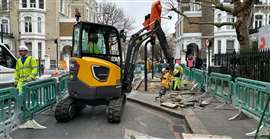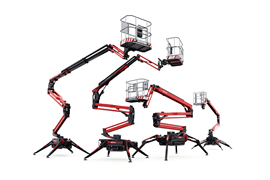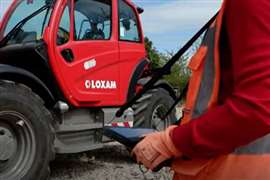London Calling: compact diesel machines under scrutiny in capital amid push for cleaner construction sites
29 July 2025
As the largest city in Western Europe, London is coming under greater pressure to cut the air pollution caused by some 5,000 mini excavators and other compact equipment operating within the city limits. That was clear when Volvo CE brought together industry leaders, policy makers and clean air campaigners to demand a change at a London Climate Action Week round table last month.
 Image: Dall E
Image: Dall E
“Cities like London are making great progress to improve air quality. But ignoring construction equipment in low emission policies misses a key health opportunity,” says Thomas Bitter, head of the compact business unit at Volvo Construction Equipment.
“Zero-emission solutions exist, but adoption is too slow. We need full value chain collaboration to break down barriers to change and speed up the shift to emission-free construction that is so essential for urban health.”
Bitter was speaking at a high-level roundtable hosted during London Climate Action Week last month, where industry leaders gathered to address the growing evidence that diesel-powered construction equipment—particularly compact machines—are a major contributor to the capital’s air pollution problem.
London Climate Action Week
As one of the world’s largest manufacturers of electric construction equipment, Volvo CE used the event to highlight how diesel-powered compact machines under 10 tonnes, which currently fall outside the city’s Ultra Low Emission Zone (ULEZ), are a blind spot in current urban emissions policy.
Unlike passenger vehicles or even larger construction equipment, Volvo CE says that these smaller machines are often not fitted with particulate filters and can emit disproportionately high levels of nitrogen oxides (NOx) and particulate matter (PM).
 Mete Coban, Deputy Mayor of London (center) with Thomas Bitter, head of the Compact Business Unit at Volvo CE (left). Photo: Radski Photography/Volvo CE
Mete Coban, Deputy Mayor of London (center) with Thomas Bitter, head of the Compact Business Unit at Volvo CE (left). Photo: Radski Photography/Volvo CE
According to Volvo CE figures, compact machines make up a third of Europe’s construction fleet, but account for more than 50% of the sector’s NOx emissions. In London alone, around 5,000 mini excavators are operating today emitting as much NOx and PM as 100,000 diesel cars.
Those concerns were echoed by policymakers and campaigners in the capital.
“Clean air is a matter of social justice,” said Mete Coban, London’s Deputy Mayor for Environment and Energy. “Reducing emissions from construction equipment is key to cleaning up our air, and we are leading the way by tightening standards ahead of a complete zero-emission requirement by 2040.”
Rosamund Adoo-Kissi-Debrah CBE, founder of the Ella Roberta Foundation, added: “Inaction is no longer an option. We owe it to future generations to treat air pollution as the public health crisis it is.”
Volvo’s figures are also supported by new research from The University of Manchester, which found that in some parts of central London, construction machinery now produces more black carbon—a harmful component of PM—than road traffic.
Black carbon levels in London
The study, conducted in partnership with the UK Centre for Ecology & Hydrology, the University of York, Zhejiang University and the National Centre for Atmospheric Science, used a technique called eddy covariance to trace sources of pollution from a lab near the top of the BT Tower.
The findings, published in Environmental Sciences: Atmospheres, mark the first time this method has been used in Europe to directly compare black carbon emissions from traffic and construction. While overall air quality in London remains better than cities like Delhi or Beijing, the data showed that in areas of dense construction activity, diesel-powered generators, diggers and site equipment are now dominant contributors to black carbon levels.
 The trial in Redcliffe Gardens, London, used an ECR25 Electric excavator to help remove nearly 8kg of NOx and NHMC emissions. Photo: Volvo CE
The trial in Redcliffe Gardens, London, used an ECR25 Electric excavator to help remove nearly 8kg of NOx and NHMC emissions. Photo: Volvo CE
Volvo CE has been a pioneer in manufacturing electric construction equipment. The OEM announced all the way back in 2019 that it was stopping new diesel-powered versions of certain compact equipment in favour of electric machines and at Bauma 2025 showcased only electric machines.
At the roundtable, Volvo CE also presented the results of a 12-week pilot in partnership with Transport for London (TfL) and contractor FM Conway, in which diesel-powered machines were replaced by three of Volvo’s electric models. The project led to the removal of nearly 8kg of NOx and non-methane hydrocarbons (NHMC) from the streets—the equivalent of a diesel car travelling more than 39,000 miles.
Nonetheless, Bitter admits that uptake for battery-powered compact machines, both in London and around the world, remains slow.
Speakers acknowledged that many rental companies remain hesitant to procure battery-powered mini excavators due to higher upfront costs, inconsistent demand from contractors, and limited on-site charging infrastructure.
Call to policy makers
Bitter emphasised that these challenges are not insurmountable—but require political will and smarter procurement. “Public tenders must include emission-free requirements,” he said. “That’s how we will begin to normalise this equipment in cities where the health impact is greatest.”
Although London has set a target for zero-emissions construction sites by 2040, current regulations leave significant gaps. The city’s Non-Road Mobile Machinery Low Emission Zone only applies to engines between 37kW and 560kW, and enforcement is patchy. Campaigners are urging the city authorities to go further, updating requirements and aligning with cities like Oslo and Copenhagen, where fossil-fuel-free requirements are already embedded in public project tenders.
“Electrification of compact equipment isn’t a future technology. It’s already here—we just need the right conditions for it to thrive,” said Bitter. “With bold policy, modern procurement and greater investment in infrastructure, we can deliver the cleaner, quieter, and more sustainable cities that everyone wants.”
STAY CONNECTED



Receive the information you need when you need it through our world-leading magazines, newsletters and daily briefings.
CONNECT WITH THE TEAM












